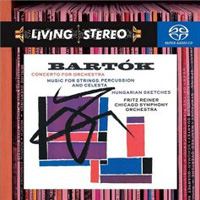 |
| June 1, 2006 The Reiner Sound Preserved
Reiner (1888-1963) did not quite fill out a full ten years as music director in Chicago, but what he achieved there was phenomenal. In reaching the capstone of his own career he brought the Chicago Symphony to such a level that it was regarded by many as the finest orchestra in the world. By way of illustration, one remembers the reopening of Vienna’s famous Opera House, in November 1955. The building had been destroyed toward the end of World War II more than ten years earlier, and it was rededicated in a month-long series of festival performances. The official announcements listed the conductors of the various operas pretty succinctly -- for Fidelio, "Conductor: B÷hm"; for Aida, "Conductor: KubelÝk"; for Der Rosenkavalier, "Conductor: Knappertsbusch" -- but for Die Meistersinger alone there was an exception: "This opera will be conducted by Dr. Fritz Reiner of the Chicago Symphony Orchestra." Perhaps the most remarkable aspect of the status thus implied was that the Chicagoans did not tour internationally under Reiner: the recognition was earned in very large part through their remarkable recordings. Fortunately for us, those recordings were numerous enough to show Reiner and his troops in a broad range of repertory, and, while they marked the very beginning of stereophonic recording for LP (Reiner’s first Chicago sessions were made toward the end of his first season there, in the spring of 1954), they were outstanding technically, and in their various reissues over the decades they have held their place as "demonstration class." Richard Mohr and Jack Pfeiffer, the famous producers who made those landmark recordings, are gone now. The company in its present form (the wildly unimaginable merger of what used to be RCA Victor and what used to be American Columbia!) has been bringing them back, a few at a time, in stunning new SACD editions. Perhaps the most telling factor in these revivals is that they are not merely reissues in the ordinary sense, but in each case have been made from the original master tapes. In a recent interview with Tully Potter, the editor of the British quarterly Classic Record Collector, John Newton (of Soundmirror), the engineer responsible for these SACD versions, pointed out that the master tapes had not been used for the earlier CD reissues, which "were made from stereo mixdowns from the 1960s and 1970s." Among other considerations, that meant, of course, that everything was limited to a two-channel format; now, however, most of the material on the hybrid SACDs is offered in the three-channel form in which it was actually recorded. The two-channel layer, too, as John Newton noted in that interview, "is completely new, from the original tapes."
...Richard Freed
Ultra Audio is part of the SoundStage! Network. |
 The premise of this series
called "Keepers" is that there is a substantial number of recordings that have
for one reason or another disappeared from circulation but are very much worth hunting for
-- recordings in which the performances are in many instances incomparable and in which,
almost as frequently, the sound quality is by no means a handicap to be tolerated, but is
fully up to the requirements of the music and the excellence of the performances. Having
just accomplished perhaps the longest single sentence in the series so far, I would like
to give thanks for Sony/BMG’s continued attention to RCA Victor’s "Living
Stereo" series, and in particular the marvelous recordings by the Chicago Symphony
Orchestra under Fritz Reiner.
The premise of this series
called "Keepers" is that there is a substantial number of recordings that have
for one reason or another disappeared from circulation but are very much worth hunting for
-- recordings in which the performances are in many instances incomparable and in which,
almost as frequently, the sound quality is by no means a handicap to be tolerated, but is
fully up to the requirements of the music and the excellence of the performances. Having
just accomplished perhaps the longest single sentence in the series so far, I would like
to give thanks for Sony/BMG’s continued attention to RCA Victor’s "Living
Stereo" series, and in particular the marvelous recordings by the Chicago Symphony
Orchestra under Fritz Reiner. In any event, whether you
have a multichannel system or conventional two-channel CD capability, the Reiner
"Living Stereo" material now is every bit as revelatory as before in the musical
sense, and brings new sonic benefits in respect to transparency, a remarkably richer low
end, and all-round realism. The two most essential Reiner items, basic to any serious
collection, were both in the initial release of Living Stereo in SACD: the matchless
account of Bartˇk’s Concerto for Orchestra, with the same composer’s Music
for Strings, Percussion and Celesta and Hungarian Sketches [82876-61390], and
the similarly all-surpassing performances of the Strauss tone poems A Hero’s Life and
Thus Spake Zarathustra [82876-61289]. Very close behind, in terms of
indispensability, is a disc in the latest batch: Debussy’s orchestral masterwork La
Mer and Respighi’s Pines and Fountains of Rome [82876-71614]. There
is quite a contrast between the subtleties realized in Debussy’s "Play of the
Waves" and the proud vulgarity of "The Pines of the Appian Way," but Reiner
didn’t neglect the dazzling colors in the former or the imaginative background in the
latter: he never missed anything, and neither did the RCA Victor production team.
There is more, of course, than these three discs, and still more on the way.
In any event, whether you
have a multichannel system or conventional two-channel CD capability, the Reiner
"Living Stereo" material now is every bit as revelatory as before in the musical
sense, and brings new sonic benefits in respect to transparency, a remarkably richer low
end, and all-round realism. The two most essential Reiner items, basic to any serious
collection, were both in the initial release of Living Stereo in SACD: the matchless
account of Bartˇk’s Concerto for Orchestra, with the same composer’s Music
for Strings, Percussion and Celesta and Hungarian Sketches [82876-61390], and
the similarly all-surpassing performances of the Strauss tone poems A Hero’s Life and
Thus Spake Zarathustra [82876-61289]. Very close behind, in terms of
indispensability, is a disc in the latest batch: Debussy’s orchestral masterwork La
Mer and Respighi’s Pines and Fountains of Rome [82876-71614]. There
is quite a contrast between the subtleties realized in Debussy’s "Play of the
Waves" and the proud vulgarity of "The Pines of the Appian Way," but Reiner
didn’t neglect the dazzling colors in the former or the imaginative background in the
latter: he never missed anything, and neither did the RCA Victor production team.
There is more, of course, than these three discs, and still more on the way.